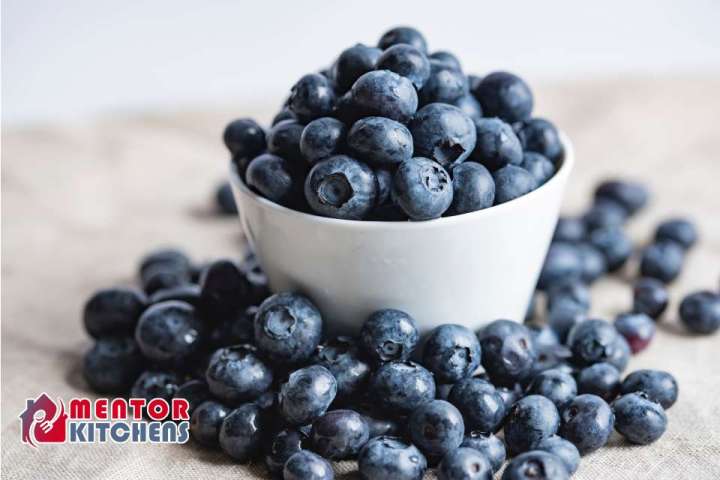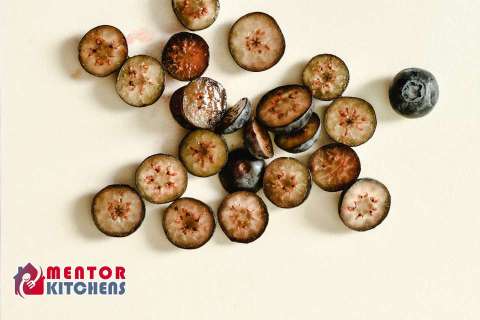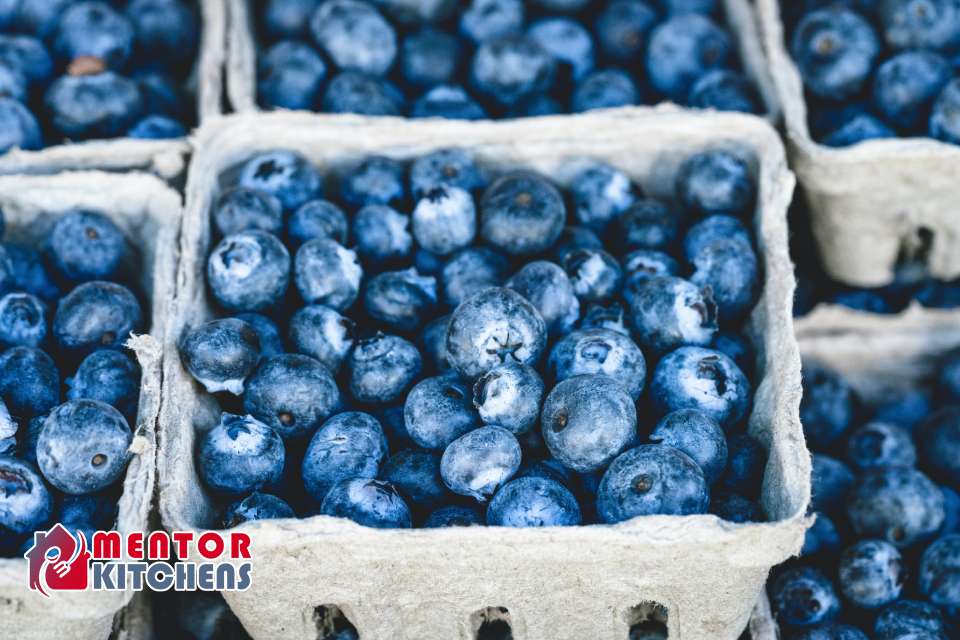Blueberries are a popular fruit that is known for their delicious taste and numerous health benefits. They are packed with antioxidants, vitamin C, and other important nutrients that can help protect against a range of illnesses and diseases.
However, many people may not be aware that blueberries also have seeds. Despite their small size, these seeds play an important role in the blueberry’s makeup and nutritional profile.
In this discussion, we will explore the question of whether or not blueberries have seeds. We will also delve into the nutritional value and health benefits of blueberries, as well as how they are grown and harvested.
Whether you are a seasoned blueberry lover or are just starting to learn about this delicious fruit, we hope you will find this discussion informative and helpful. So, let’s get started!
What Are Blueberries?

Blueberries are a type of small, sweet fruit that belong to the Vaccinium family of plants. They are native to North America and are prized for their delicious taste and numerous health benefits.
Blueberry History
Blueberries have been a part of the human diet for thousands of years. Native Americans have been harvesting and consuming wild blueberries for centuries, and they were also a staple food for many other indigenous cultures.
In the early 20th century, blueberries were commercially cultivated and became widely available in grocery stores and markets. Today, they are grown in many parts of the world, including the United States, Canada, Europe, and South America.
Nutritional
Blueberries are an excellent source of vitamins and minerals, including vitamin C, vitamin K, and manganese. They are also high in antioxidants, which are substances that can help protect the body from damage caused by free radicals.
In addition, blueberries are low in calories and have a low glycemic index, making them a healthy choice for people with diabetes or those who are trying to control their blood sugar levels.
Do Blueberries Have Seeds?

Yes, blueberries do have seeds. These seeds are small, typically measuring around 2mm in length. They are ovate in shape and have a hard texture.
The seeds are located in the inner core of the blueberry and are distributed throughout the fruit, with the majority concentrated at the stem end. They are not always easy to detect as they are small and blend in with the flesh of the fruit.
However, despite their small size, these seeds play an important role in the blueberry’s makeup and nutritional profile, They contain a number of nutrients, such as Omega-3 and Omega-6 fatty acids, Vitamin E, and antioxidants, which makes them beneficial to consume.
What Are The Benefits Of Blueberry Seeds?

High in Nutrients:
Blueberry seeds are a good source of several essential nutrients, including protein, fat, and dietary fiber. They also contain a range of vitamins and minerals, including vitamin E, potassium, and zinc.
Antioxidant Properties:
Blueberry seeds are a rich source of antioxidants, which can help to protect the body against the damaging effects of free radicals. These compounds are thought to play a role in reducing the risk of several chronic diseases, including heart disease and cancer.
Heart Health:
Some research suggests that blueberry seeds may have potential benefits for heart health. They contain compounds that may help to reduce inflammation and improve cholesterol levels, both of which are important for maintaining a healthy heart.
Skin Health:
Blueberry seeds are rich in antioxidants, which may help to protect the skin against damage caused by environmental factors such as pollution and UV radiation. They may also have anti-aging properties, helping to reduce the appearance of wrinkles and fine lines.
Weight Management:
Blueberry seeds are a good source of dietary fiber, which may help to support weight management by promoting feelings of fullness and reducing the risk of overeating.
Brain Health:
Some research suggests that the nutrients found in blueberry seeds may support brain health and cognitive function. For example, they contain compounds that may help to improve memory and reduce the risk of age-related cognitive decline.
Types of Blueberries:

There are several types of blueberries, each with its own unique characteristics and uses. Some of the most popular varieties include:
Highbush Blueberries: These are the most common type of blueberry, and they are typically what you will find at the grocery store. Highbush blueberries can grow up to 12 feet tall and produce large, plump berries. They have small seeds that are not always easy to detect and hard to feel while eating. The seeds are edible and safe to consume, but they might not be digested easily.
Lowbush Blueberries: Also known as wild blueberries, these are smaller than highbush blueberries and typically grow closer to the ground. They have smaller berries and seeds. They are typically found in the wild, but can also be grown in gardens. The seeds in these blueberries are relatively small and not very noticeable when eating, and have similar nutritional content as the Highbush blueberries
Rabbiteye Blueberries: These blueberries are native to the Southeast United States and have larger berries than highbush blueberries. They have small seeds and are not always easy to detect, and have similar nutritional content as the Highbush blueberries.
Southern Highbush Blueberries: These blueberries are a hybrid of highbush and rabbiteye blueberries and are well adapted to warmer climates. They have small seeds, similar to the Highbush blueberries.
Northern Highbush Blueberries: These blueberries are native to the Northern parts of the United States and Canada. They are cold hardy and have small seeds, similar to the Highbush blueberries.
Overall, all types of blueberries do have seeds and they are small and not very noticeable when eating, but they still provide additional nutritional benefits. The seeds are edible and safe to eat and they do not affect the taste of the fruit.
Can You Remove the Seeds from Blueberries Before Eating Them?
The seeds of blueberry are very small and are not noticeable when the fruit is eaten whole. However, if you wish to remove the seeds, you can do so by gently crushing the blueberries and straining them through a sieve.
How to Remove Blueberry Seeds: Step-by-step Guide
Removing blueberry seeds from the pulp is a fairly straightforward process that can be done in a few simple steps. Here’s how to do it:
Step-by-Step Instructions:
- Begin by rinsing the blueberries thoroughly under cold running water to remove any dirt or debris.
- Next, add the blueberries to a blender or food processor and pulse until they are broken down and form a smooth puree.
- Strain the puree through a fine-mesh sieve or a cheesecloth-lined strainer set over a bowl.
- Use the back of a spoon or a rubber spatula to press down on the solids and extract as much juice and puree as possible.
- Discard the seeds that remain in the sieve or strainer.
Is it Necessary to Remove the Seeds?
It is not always necessary to remove the seeds from blueberries, as they are small and edible. However, some people prefer to remove the seeds for aesthetic reasons or to use the blueberries in recipes where the seeds may be noticeable or undesirable.
Frequently Asked Questions:
How Many Seeds Does a Blueberry Have?
Blueberries typically have 10-20 small seeds per fruit.
Is It Safe to Eat the Seeds of a Blueberry?
Yes, it is safe to eat the seeds of a blueberry. They do not contain any harmful chemicals and provide additional nutritional benefits.
Are Blueberry Seeds Edible?
Yes, blueberry seeds are edible and can be eaten along with the rest of the fruit.
Do Blueberries Belong to the Nightshade Family?
No, blueberries are not nightshade. Blueberries are a type of berry that belongs to the genus Vaccinium, which also includes cranberries, huckleberries, and bilberries.
Nightshades are a group of plants that belong to the Solanaceae family, which includes vegetables such as tomatoes, peppers, eggplants, and potatoes, as well as some fruits like goji berries and ground cherries.
Nightshades have a reputation for being inflammatory for some individuals, and there are some people who need to avoid them for health reasons. Blueberries, on the other hand, are considered to be healthy food, high in antioxidants and other nutrients.
Can You Grow a Blueberry Plant from the Seeds of a Blueberry?
Yes, it is possible to grow a blueberry plant from the seeds of a blueberry, but it can be a challenging and time-consuming process. The seeds must be extracted from the fruit and then undergo a process of stratification, where they are exposed to cold temperatures for some time, to germinate.
Do All Blueberries Have Seeds or Are There Seedless Varieties?
All blueberries have seeds, although the size and number of seeds can vary slightly depending on the variety. There are no seedless varieties of blueberries.
Do the Seeds of Blueberry Have Any Health Benefits?
Blueberry seeds are a source of nutrients, including healthy fats, protein, and fiber. They also contain antioxidants, which may have various health benefits.
Can Blueberry Seeds Be Used in Cooking or Baking?
Blueberry seeds can be used in cooking and baking, but their small size and hard texture mean that they are not typically used in this way. Instead, blueberries are usually used whole or mashed and incorporated into recipes.
Are Blueberry Seeds the Same As the Seeds Found in Other Types of Berries?
The seeds of different types of berries can vary in size, shape, and texture. However, the seeds of most types of berries are edible and contain nutrients such as healthy fats, protein, and fiber.
Do the Seeds in Blueberries Affect the Taste of the Fruit?
The seeds of blueberry are very small and do not significantly affect the taste of the fruit.
Conclusion
In conclusion, blueberries are a delicious and nutritious fruit that has been enjoyed by humans for centuries. They are native to North America and are now grown in many parts of the world.
Blueberries are high in antioxidants, vitamins, and minerals, are low in calories, and have a low glycemic index. While they do have seeds, they are small, hard, and usually oval-shaped. They can be difficult to chew and some people may choose to remove them before eating the fruit.
However, blueberry seeds are also a good source of nutrients, including protein, fat, and dietary fiber. They have a range of health benefits, including reducing inflammation and improving cholesterol levels, protecting the skin and promoting weight management, and supporting brain health and cognitive function.
If you want to remove the seeds from blueberries, it is a simple process that can be done using a blender, food processor, sieve, or cheesecloth.



Leave a Reply